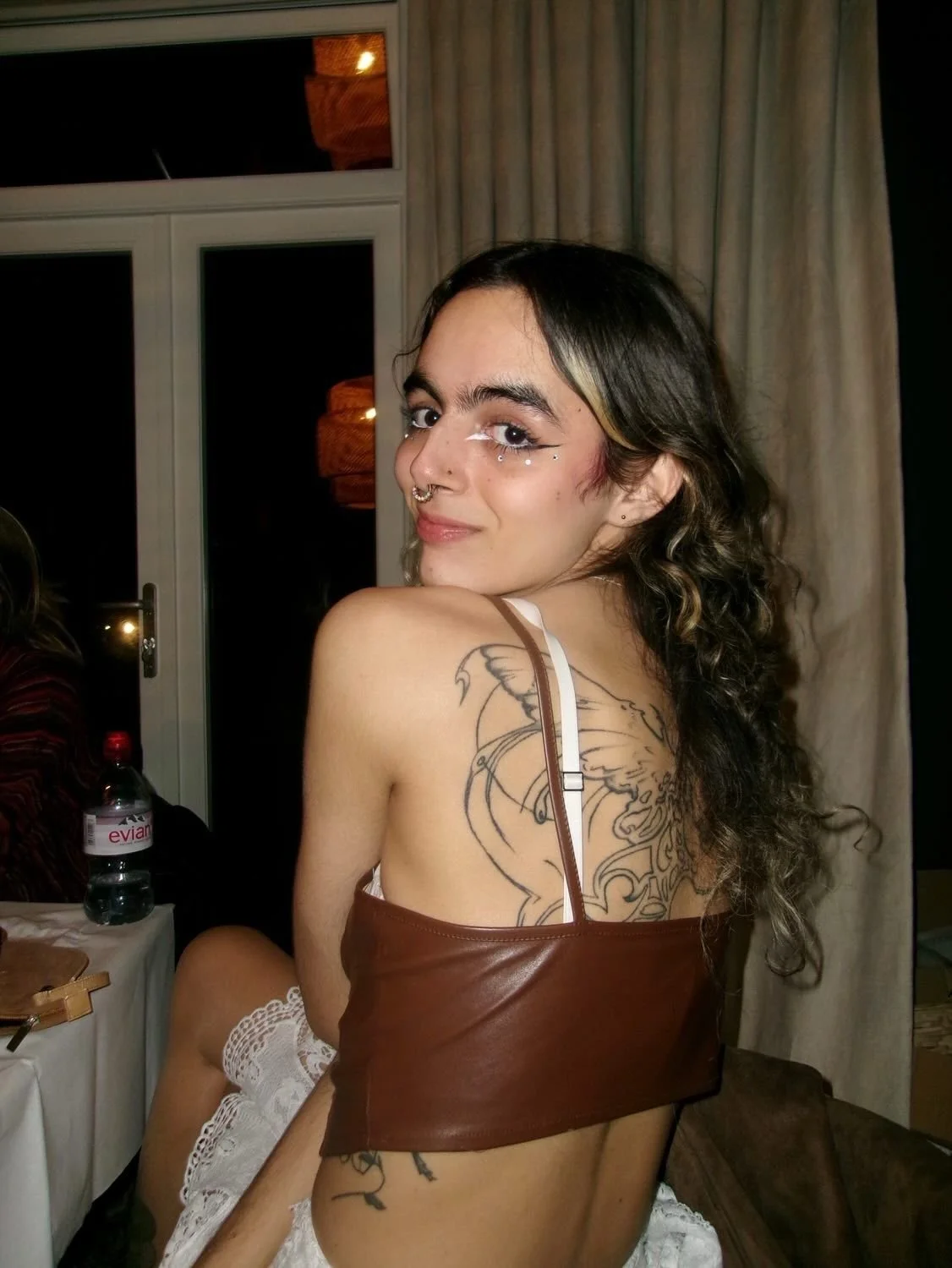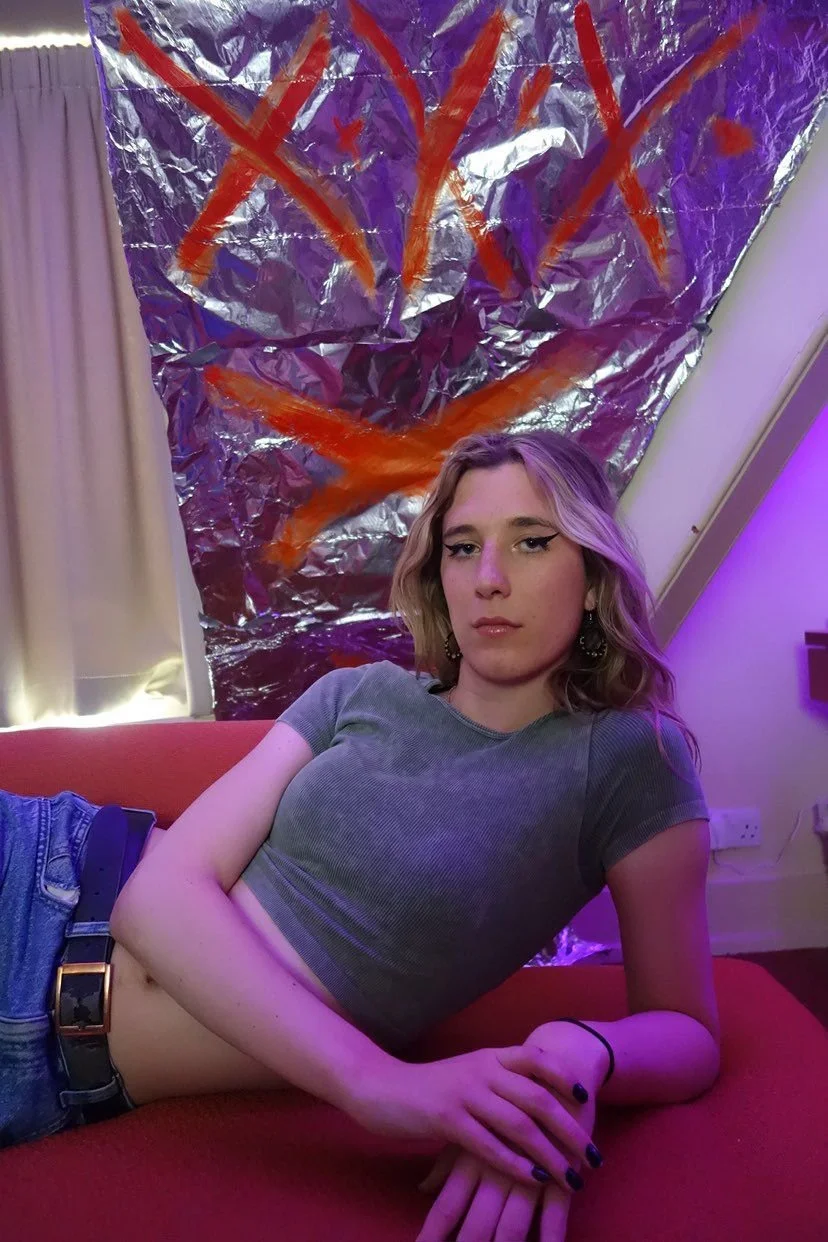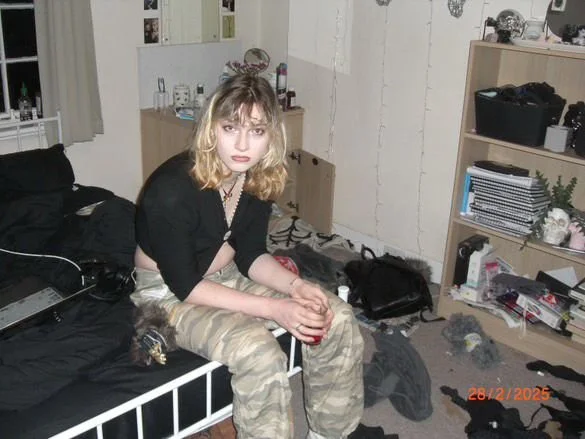There are Transsexuals Behind These Walls, My Dear
Sit by the river Cam and you’ll notice stories glean across the water. With every gesture, the punters weave history into the air, and one hears talk of the many-great-deeds of the many-great-men who lived - if you look over to the side here - within these many-great-walls.
Walk into these buildings and one sees these men painted and rendered, framed and held proud in full view. Further, they speak Latin in these halls - the language of lineage, pedigree, and imperial chic - spoken in reverence to the Greco-Roman Ikea that flatpacked and delivered the foundations of all 32 colleges; instructions included!
Looking upon this seamless chronicle, one concludes: White women were invented in the 20th century. Black people in the second half. It shouldn't be hard to figure out who did it; I’m sure his handsome face is up elsewhere in this room.
And yet… pull into a darkened crevice. A no-good ditch fit for nought but a festering bitch. You might find a crowd for whom this story falls flat. They have a gaze that warps the gold leaf; within the grandeur they see cracks…
There are transsexuals in these walls my dear! Lacking a rendering in oils, each one arrives as if the first. So, what do they have to say about this place? Cast from the comforts of normalcy, looking from the outside in - what musings might they offer?
‘I don't think that Cambridge is more accepting,’ says Gabriel, ’within an insular student community it can get very hierarchical.’
For many, Cambridge represents the opportunity for a picture perfect relationship. However, for those outside the frame, the university exhibits a strikingly different image.
‘I think a lot about desirability; all the trans girls from uni had interesting things to say about that. I had a friend who was really beautiful, conventionally attractive, and affluent too. She came from ‘a good family’. But she was mixed black, and she really felt that ostracism. Not from our friend group, but she could feel how she was treated differently, by boys and stuff compared to all of our friends who were… white and blonde, y’know?’
Not on a level of attraction, but on a level of respect - it seems that many do away with courtesies when talking to trans women.
Gabriel continues, recalling one such encounter - ‘He was messaging me like a complete horny weirdo. Like within like three, four messages, he was all ‘my cock is so hard for you, I want you so bad baby…’ It was uncouth. That's what it was. It was unbecoming of a young man!’
“It was unbecoming of a young man!”
‘Immediately, he was asking: wine at yours; Saturday night? And to me that felt like a crazy thing to say to a person; it’s so suspicious. Instead of going to his - was never going anyway - I went to see some of the Dolls and I told them about this and they asked me - ‘oh, what's his name?’ I tell them and we realize, Oh My God, he's been messaging my friend for a few days with the exact same thing. Obviously he's just some weird chaser who doesn't respect either of us. She was quite hurt by that and I can totally understand why. It’s degrading. It’s like we’re literally all just the same to him.’
On the other side of the spectrum, there are those who try their best to not offend. Much akin to an 1800’s anthropologist meeting an uncontacted tribe, they will hold their hands in the air, let it be known they’re one of the good ones, and press that they mean no harm. Having learned the local dialect, they promptly inform you: ‘slay the pussy boots house down queen’ - affording upon you a compliment in the native custom.
‘I have spent a lot of time doing Cambridge theatre,’ says Lucy ‘in terms of the type of people there… they love their pronoun circles. They're very worried about being ‘correct’ and I think to a certain extent that's good. It provides a real space to explore gender safely.’
However, this acceptance is sometimes surface level. As Lucy explains, ‘me and my friend Oscar were in a student written play. It was the two of us trans people and everyone else involved with the show was cis. It basically centred on a catholic family where a woman's son comes out as gay.’
‘At a certain point Oscar's character - not the brother who comes out - comes home and has a pierced ear and the Catholic mum freaks out, right? She says ‘oh you're basically a transexual’. The gay son in his brother's defense says ‘oh I think for him to be a woman the hole needs to go in another place’ and I'm like ah! okay! interesting!’
‘We go to the director and say - listen, we don't want to cause problems. We just think this line probably isn't great. Anyway, the writer came for a rehearsal and spoke to us, saying ‘I just want to apologize, you know… for using a certain word’. Me and Oscar looked at each other like word? The word transexual? We were talking about the sex change joke!’
Theorising as to the psychology of this demographic, Lucy explains: ‘I think it's wanting to be seen as woke, and getting the ‘trans thing’ but kind of almost assuming they’re already there - even while missing quite a big chunk.’
See, Cambridge is home to a peculiar paradox. Listen to the Telegraph and this university is a nesting ground for the most viperous of liberals. It’s on the front steps of Senate House where the British Empire takes its last breath, so neon are the hair colors in the graduating class of 2025. On the other hand, this is a place of immense privilege, of Daddy’s money galore! So how is it that these truths can be reconciled?
For Luna, this takes shape in a certain group of ‘people who are queer and completely blind to intersectional issues. They think that the specific identity trait that makes them oppressed in some way is the only one that anyone has ever had. I specifically mean almost always white queer people, often cis, or not materially trans.’
‘They wouldn't go to a trans rally. They wouldn't go to a Palestine rally. Even if they believe in these things which I'm sure they do, they just don't do anything material with that. I think this may be cynical and not fair, but I believe this is the majority queer people in Cambridge. You know, they will sit there and do nothing and then think they’ve thrown the first brick at queerbridge! They repost an Instagram infographic and say ‘that's my praxis for today!’ You know, I’ve not seen you at a single protest. I haven't seen you do anything in the real world. But I've seen you in Fitzbillies…’
“You know, I’ve not seen you at a single protest. I haven't seen you do anything in the real world. But I've seen you in Fitzbillies…”
On the queer community at large, Lucy says - ‘I think what is really good about Cambridge is that even though it’s small there are loads of queer people here anyway.’ On the other hand, she points out that the queer scene suffers from an unforgivable injustice. Against all laws of nature ‘the dolls aren’t given their rightful place. In Cambridge, you have the twinks on top… and why are they topping anything?’
“In Cambridge, you have the twinks on top… and why are they topping anything?”
Queer scene aside, most of the Cambridge experience is spent chewing through copious amounts of information, only possible through consuming enough redbull to decimate a small ecosystem. So the question must be asked - during their time here, how have the dolls been impacted by what they’ve learned?
Gabriel, who studied MML says ‘It became quite hard emotionally, especially when I was reading books and the protagonists, for example trans sex workers in Latin America - didn’t have very nice lives. Especially having to construct an essay on the topic and write it up. Sometimes it was quite difficult.’
‘When I read those books, my supervisors would ask me about alternative models of family and life and love. And I just felt like… no! Because every single character in the book is a sex worker who dies or gets arrested, or ends up in poverty and obscurity by the end of the novel. Every single character has an unhappy ending… I don't know! Maybe you find reading a story about a brutalized trans sex worker who finds found family with other brutalized trans sex workers to be heartwarming. But I can't really get past the fact that they're all brutalized sex workers. It's not heartwarming to me; that's not an alternative queer future to me. Like - that's awful. And they need unions!’
‘But I think having these tools to be able to critically understand the frameworks that oppress me as opposed to just having this as a challenge in life. I feel like it makes it worse. Because you can't just logic a solution out of it, right?’ Maybe I could detransition and get a lobotomy. Maybe I'd be fine. Maybe I could get away with it!’
“Maybe I could detransition and get a lobotomy. Maybe I'd be fine. Maybe I could get away with it!”
Looking into the STEM side of things, Lucy says, ‘I don't know if this is a result of my degree or like a combination of things, but I'm not a huge fan of scientific arguments for transness or sexuality. I think in general my degree has dissuaded me against the rigidity of biological definitions. You can never really ever say anything super definitive in biology, you can never really say ‘oh it always works this way’ because there's always one tiny little time where it doesn't work that way.’
‘So, I think especially when you start to get into categories like sex, it's more useful to talk about the idea of sex as something that is helpful to us to understand biology rather than constituting biological reality itself; it's a human concept that we project on biology to make it easier to understand.’
“It's more useful to talk about the idea of sex as something that is helpful to us to understand biology rather than constituting biological reality itself”
‘And this applies to many things! Take the concept of a species, for example - biologists widely accept that it doesn’t perfectly describe 100% of cases. They acknowledge that what we define as a species isn’t an absolute biological reality, but we still use the term because, even though it’s imperfect, it helps us make sense of the world.’
‘We shouldn’t pretend exceptions don’t exist. I think this is a similar case. It’s easy to apply the same logic to sex, right? We often understand sex as a binary, even though we know that’s not entirely accurate. We don’t have a definition of sex that fully accounts for everything that exists, but it remains a useful concept for understanding certain aspects of biology.’
While it is doubtful that Hawking would’ve started his day with a sugary sensation under the tongue, with three minutes silence to sublingual estradiol - undeniably this still constitutes a part of the Cambridge experience. The Dolls have been behind the castle walls, seen the paintings, pillars and all!
Reflecting on her time at university, Gabriel says a lot of it was a surprise, due to coming from a state school, and further not having ‘formal support for coming to uni, mostly because I didn’t have a great relationship with my parents - which is pretty common for a lot of young queer people.’
Thinking about how others perceived her she laughs - ‘to be honest, people knew me for partying etc. I was like this crazy northern trans party girl.’
She muses on how the experience affected her - ‘In Cambridge, I can walk around without feeling at risk in the same way I did back home. There’s a kind of freedom in that. When I moved here, I already had pink hair and these little gay boy outfits, but I definitely felt safer leaning into that side of myself. It gave me the space to explore how I wanted to present, which eventually led to me being more fully out.’
Describing her experience of the city, Luna says ‘It has its ups and downs - being a transsexual anywhere does - but I think Cambridge is one of the better places I’ve experienced. I came here already out, so I haven’t really known anything different. Honestly, I dread going home more than staying here, because at home, I might run into people who don’t know me as this person.’
‘In Cambridge, I’ve always just been this person. Even when I first arrived - when I was awkward and not doing my makeup every day, not even shaving every day - I still only went by one name.’
Mulling over whether Cambridge is one of the better places to be trans, she says ‘It’s the main place I know, to be honest. I haven’t really tried being trans anywhere else. Norwich was nice - very gay city, lots of young queer people with rainbow tote bags and emo hair, loads of 14-year-olds figuring themselves out. It’s a different vibe. It always felt quite safe, but I don’t know, Cambridge has always felt safe too, at least compared to a lot of places.’
‘And I think, because being trans here is all I’ve really known, I’ve never experienced the privilege of not looking trans in this city. I’ve never known what it’s like to be here and not feel like I have to think about it. But out of the places I’ve been, Cambridge is my favorite - though that might just be because it’s really the only place I’ve been.’
Finally, Lucy reflects - admitting that ‘I love to bitch and moan, and I think there are a lot of problems - both with Cambridge as an institution and as a community - that still need to be addressed. That said, I’m glad I got to spend these years in this bubble.’
In the same vein as the others, her transition coincided with her time at university - ‘as a trans woman who had already started transitioning but really properly did so during my time here - over the last nearly four years - the bubble gave me a kind of safe environment to build my identity and sense of self in a way I hadn’t been able to in rural Oxfordshire.’
‘At this point, I feel like I’ve sort of outgrown it. But that doesn’t mean I haven’t been stepping outside the bubble - I’ve spent a lot of time in London, going to events and parties and just experiencing things outside of Cambridge.’
She explains how in Cambridge ‘my egg cracked - but, you know, like a baby chick under the heat lamp.’
‘I feel like I’ve outgrown the Cambridge bubble now, but I’m really grateful for it, especially in my first two years. It gave me something I needed.’
“My egg cracked - but, you know, like a baby chick under the heat lamp.”
Some arrive fully framed, rendered, and named. While others carve their own name in the wall with a nail file and say: I was here too. Maybe no one hangs their portrait. But they still leave something behind. A story, a scandal, a trail of glitter in the college bathroom. Evidence.
So no matter how much these corridors, these monuments to the deeds of monotonous Great Men will try to tell a different story - let it be known that there are transsexuals behind these doors my dear!



